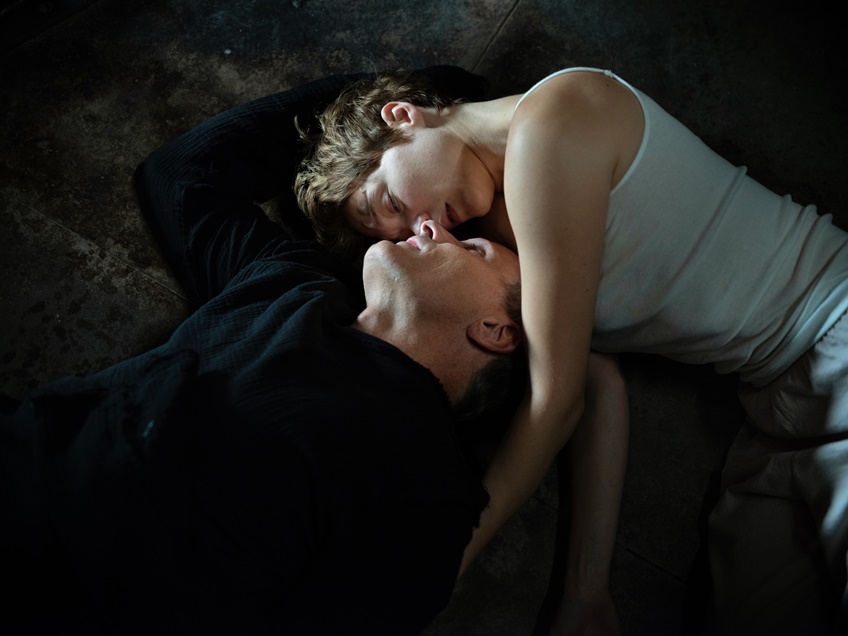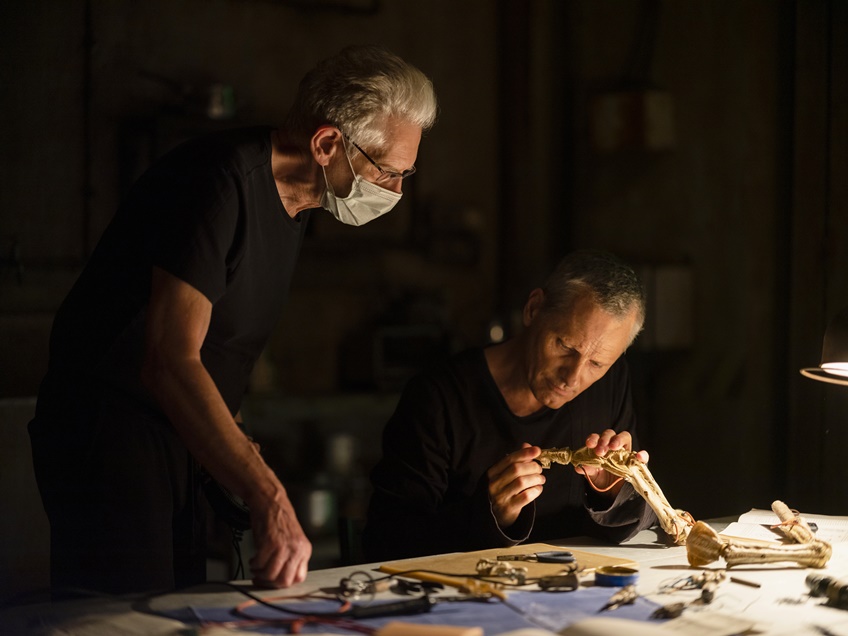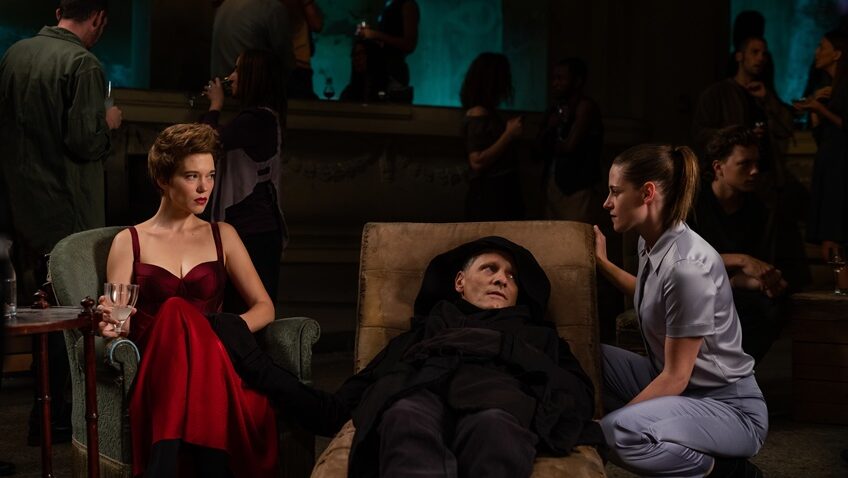Joyce Glasser reviews Crimes of the Future (September 9, 2022) Cert 18, 108 mins.
The title, the 18 certificate and the 79-year-old writer-director’s name, David Cronenberg, is already a lot of information going into this body-horror film. This is, after all, a genre Cronenberg is credited with spawning on the world like the new designer organs produced by and extracted from his impenetrable and highly original characters in Crimes of the Future.
Cronenberg presents a dystopian world in which humans are mutating too fast for society to process. The world is in a state of Accelerated Evolution Syndrome, as a result of which humans no longer feel pain. Self-harm is no longer the preserve of the bullied teenager but is practiced in makeshift surgeries in dark, damp side streets or turned into performance art by celebrity duo Saul Tenser (Viggo Mortensen) and Caprice (Léa Seydoux). In this decadent new world, sex and surgery have become indistinguishable, but the surgery is the entertainment.
Here, Cronenberg might be having a laugh at his own profession, for if surgery is the new art house cinema, can cinema make a comeback by filling the screen with it? Fellow Canadian composer and long-time collaborator Howard Shore’s ravishingly eerie and atmospheric music adds to this notion.
In presenting a fetishy item or practice as a rarefied art form attracting sexually aroused spectators with glasses of wine, Crimes of the Future paves the way for Peter Strickland’s (In Fabric, Berberian Sound Studio),18-rated new film, Flux Gourmet, out soon, which is smelly as opposed to gory.

In the powerful first sequence, an almost neo-realist style is adopted to present a little boy sitting by the polluted ocean sifting through the mud opposite a submerged tanker. His mother (Lihi Kornowski) yells at him through the window of their decrepit house instructing him not to eat anything. We are puzzled until later that evening, after brushing his teeth, the boy begins munching on the plastic waste bin. His mother has given up. Later that night, when the boy is asleep, she suffocates him, leaving his corpse for her ex-husband, Lang Dotrice (Scott Speedman) to collect. As she gives herself up to the police, while holding Lang responsible.
This subplot is pushed to the side while we meet Tenser and Caprice, who spend their days (shutters closed) – the story takes place in perpetual darkness – preparing for their performances that draw appreciative crowds. Tenser sleeps in an orchid bed that looks like a giant organic and living pod hung from the ceiling like a nest. Caprice asks her partner if he slept well. ‘I think the software needs adjusting,’ Tenser complains. ‘It didn’t anticipate my pain. It didn’t turn me.’
If the bed is strange, wait until you see how Tenser eats breakfast. He sits in a moving highchair with the arms and back resembling the skeleton of a dead creature cradling or imprisoning him. Caprice is worried because he is having trouble eating the unappetising soft concoction in front of him. As it transpires, Lang might be able to help but to say any more would be a spoiler.
Upon examination, Caprice, who met Tenser in another life when she was a qualified surgeon, finds that Tenser has produced a new organ – and it’s functioning. ‘It’s shifting my pain centre.’ This is how these self-obsessed hedonists talk. But they do not operate in a vacuum and others are interested.
Mortensen’s Tenser walks the streets in a dark robe with a hood like Death in Bergman’s The Seventh Seal (one of Cronenberg’s father’s favourite films). He and Caprice are summoned to a new entity called The National Organ Registry, which is like something out of Orwell’s 1984 or Kafka. The bureaucrat in charge, Wippet (Don McKellar), is apologetic about the seedy office, and though he talks up the agency, you might have your doubts about it, and Wippet.
His reserved assistant, Timlin (Kristen Stewart), was in awe of Tenser before meeting him and after, she wants to jump ship and join his show. Later in the film she tells Tenser she is worried about Wippet who has tried to recruit Tenser for a Beauty Pageant for Internal Organs, before realising that the pageant is about an authentic acceptance whereas Tenser is all about rebellion.

Isolating Tenser in an empty room in the Bureau, Timlin, breathless with a newfound passion, kisses Tenser. He cannot respond, despite having confessed to Caprice that he finds Timlin attractive. ‘I’m sorry,’ he say’s ‘I’m not very good at the old sex.’
Timlin knows only too well what the new sex is and has defined it. In the film Tenser and Caprice give us a demonstration. A naked Caprice (we’ve seen Seydoux’s body in other films before) crawls onto a surgical table next to a naked Tenser, and they start performing mutual surgery, using Caprice’s remote control, which looks like a jewelled oblong jelly fish. They groan with pleasure as the blood oozes. Until Caprice is tempted to undergo decorative plastic surgery at a salon, her perfect skin is scarless, so this might be her first time under the scalpel.
Some semblance of a government is hinted at again with the arrival of Detective Cope (Welket Bungué) who meets with Tenser (unbeknownst to Caprice) for undercover reports adding a political dimension to the film. In earlier films dealing with organs, the cop would be looking for illegal organ sellers, but not here. Cope is assigned the case of the mother jailed for murdering her son. Tenser is intrigued and pays her a visit, curious about her dead son’s organs.
Everyone is a producer! Lang comes up with a spin off for Silent Witness. What about Caprice performing an autopsy on his own son in front of an audience? Never been done, perfect. What Tenser discovers is that Lang Dotrice might have the solution to our planet that is unable to feed its growing population.
At the autopsy, Caprice gives us a simile leading to the big reveal: ‘Let’s dig deep into the body and like professors of literature, search for the meaning.’
When the winner of four Pulitzer Prizes, Robert Frost was asked what poetry was, he answered, ‘poetry is metaphor.’ Having been brought up in a household of books and films, Cronenberg must think of film as metaphor, too, because characters, situations events and even sets emerge that are not to be taken literally. If you are looking for meaning here, reader, dig deep, with the scalpel of your sharp mind.




